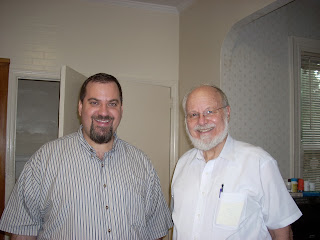How can I respect Chazal?
My last post, on how I find Judaism meaningful, even if I believe that much of the basic facts are mythology, (and where I mentioned Rabbi Akiva), elicited this response, from Yitz:
I’m probably too literal-minded, but what value could Rabi Akiva have to you if he was lying about Moshe Rabbeinu’s existence?From what you say, either: 1. Rabi Akiva was misguided and falsely believed Moshe Rabbeinu existed. 2. Rabi Akiva knowingly deceived people because it was for their own benefit. or 3. Rabi Akiva wasn’t sure about Moshe Rabbeinu, but like you, thought Judaism had enough to offer that perhaps it was worth it to perpetuate and evolve Judaism into something better for people.Either way it seems you have a relatively low opinion of Rabi Akiva, or a relatively high opinion of yourself. (In the most optimistic scenario (3), you are his equal, in the worst scenario (1) you are smarter than he.)
My response:
Of your choices, I’d have to pick #1, sort of. Why on earth would you think that I believed either #2 or #3?
But even your #1 is flawed. It’s a matter of perspective. You assume that I would see believing in a mythical figure literally as being “misguided” and “falsely believing”. I don’t. I see it as sacred myth and it doesn’t matter whether Moshe Rabbeinu existed or not. (My educated guess is he probably didn’t, and if he did, his portrayal is still a massively mythologized version and doesn’t reflect reality.)
Rabbi Akiva valued the Torah and stories within it and felt they contained deep spiritual value. So do I.
I value Rabbi Akiva as a great teacher and leader of his generation. Does that mean I have to agree with his exact world view? And if I disagree, it’s because we live in vastly different cultures and times with a vastly different set of information available. The scientific method had not yet been invented, and myth and fact were all mixed together. Fiction didn’t exist per se. Stories were assumed to be fact. The surrounding cultures had stories about the gods, stories that they assumed to be true. Rabbi Akiva not only didn’t have the facts we do today, he didn’t have the methodology and likely couldn’t even conceive of an empirically based approach.
Acknowledging all of that doesn’t mean I disrespect Rabbi Akiva or deny his greatness. It just means he was a man of his times and so am I. If I was a Jew living back then in the first century AD, I probably never would have doubted Moshe Rabbeinu’s existence either. But I live today, and I choose not to ignore empiricism.

Comments
Post a Comment